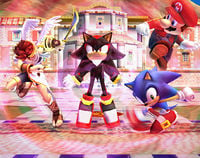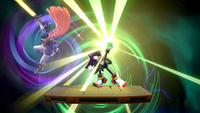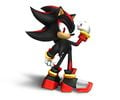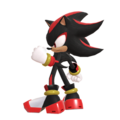Shadow the Hedgehog: Difference between revisions
m (→Origin) Tag: Mobile edit |
No edit summary |
||
| (11 intermediate revisions by 6 users not shown) | |||
| Line 8: | Line 8: | ||
|firstgame = ''{{s|wikipedia|Sonic Adventure 2}}'' (2001) | |firstgame = ''{{s|wikipedia|Sonic Adventure 2}}'' (2001) | ||
|games = ''[[Brawl]]''<br>''[[SSB4]]''<br>''[[Ultimate]]'' | |games = ''[[Brawl]]''<br>''[[SSB4]]''<br>''[[Ultimate]]'' | ||
|lastappearance = ''{{ | |lastappearance = ''{{iw|wikipedia|Angry Birds 2}}'' (2024, via update) | ||
|console = Sega Dreamcast | |console = Sega Dreamcast | ||
|species = Hedgehog/Black Arms hybrid | |species = Hedgehog/Black Arms hybrid | ||
| Line 142: | Line 142: | ||
*Much like Sonic, Shadow appears in the most ''Smash'' games out of all third-party Assist Trophies, having appeared in all games since its conception. | *Much like Sonic, Shadow appears in the most ''Smash'' games out of all third-party Assist Trophies, having appeared in all games since its conception. | ||
*Despite his trophy and official artwork sharing the same pose in ''Brawl'', the mouths on the trophy and artwork are in different positions. | *Despite his trophy and official artwork sharing the same pose in ''Brawl'', the mouths on the trophy and artwork are in different positions. | ||
*In ''Brawl'', the white of Shadow's shoes only covers the upper front similar to the red in Sonic's shoes, rather than going up to the soles like in the usual games. This was fixed in ''SSB4''. | |||
*Even on a fast moving stage such as [[Delfino Plaza]] or [[Rumble Falls]] when sped up, Shadow's effect will not stop even when he goes off the stage. | *Even on a fast moving stage such as [[Delfino Plaza]] or [[Rumble Falls]] when sped up, Shadow's effect will not stop even when he goes off the stage. | ||
*Shadow's trophy pose in ''Brawl'' resembles his artwork for ''Sonic the Hedgehog'' (2006). Similarly, his trophy pose in ''SSB4'' resembles his artwork for ''Sonic Rivals''. | *Shadow's trophy pose in ''Brawl'' resembles his artwork for ''Sonic the Hedgehog'' (2006). Similarly, his trophy pose in ''SSB4'' resembles his artwork for ''Sonic Rivals''. | ||
Latest revision as of 02:47, December 26, 2024
- "Shadow" redirects here. For other uses, see Shadow (disambiguation).
| Shadow the Hedgehog | |
|---|---|
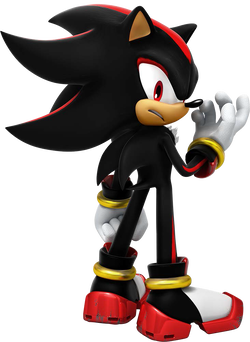  Official artwork of Shadow from Sonic Forces. | |
| Universe | Sonic the Hedgehog |
| Debut | Sonic Adventure 2 (2001) |
| Smash Bros. appearances | Brawl SSB4 Ultimate |
| Most recent non-Smash appearance | Angry Birds 2 (2024, via update) |
| Console/platform of origin | Sega Dreamcast |
| Species | Hedgehog/Black Arms hybrid |
| Gender | Male |
| Place of origin | Space Colony ARK |
| Created by | Takashi Iizuka Shiro Maekawa |
| Designed by | Yuji Uekawa |
| English voice actor | Jason Griffith (Brawl) Kirk Thornton (SSB4/Ultimate) |
| Japanese voice actor | Kōji Yusa |
| French voice actor | Benoît DuPac |
| German voice actor | Klaus Lochthove |
| Spanish voice actor | Manuel Gimeno |
| Italian voice actor | Riccardo Lombardo |
| Article on Wikipedia | Shadow the Hedgehog |
Shadow the Hedgehog (シャドウ・ザ・ヘッジホッグ, Shadow the Hedgehog) is a major character from the Sonic the Hedgehog series.
Origin[edit]
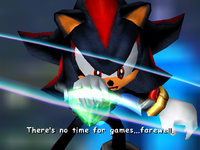
Shadow the Hedgehog is an antihero in the Sonic the Hedgehog series that either appears as an obstacle or an ally to defeat a more powerful foe. An artificially-created hedgehog known as the "Ultimate Lifeform", he made his first appearance in Sonic Adventure 2 as an antagonist who becomes an anti-heroic protagonist as the game progresses. Since his debut, he consistently holds second place as the most popular character in the franchise, trailing the eponymous character. Unlike his heroic counterpart, Shadow is a much darker character, willing to do whatever it takes to reach his goals. In later games, Shadow often appears as an anti-hero with inherently good intentions, even if his methods are unlike those of Sonic's. He features in his own self-titled game, Shadow the Hedgehog, released in 2005. After the conclusion to his story in this game, Shadow would continue to play roles in future games, mostly as a supporting character with a few playable appearances.
In Sonic Adventure 2, Shadow was created five decades before the game's events, by Dr. Eggman's grandfather, Gerald Robotnik, on the Space Colony ARK. He was the result of a successful government medical project in collaboration with the leader of the Black Arms, Black Doom, called Project Shadow, which had the goal of finding a way for life to be immortal. Soon after the project's completion, the government began to fear Shadow's power, and attempted to erase the project from public records. Fifty years later, Eggman reawakens Shadow in order to reactivate the Eclipse Cannon, a weapon of mass destruction built into the ARK. Sonic and his friends attempt to stop this plan, but both parties are eventually forced to work together to prevent the ARK from crashing into Earth. When the Biolizard, the prototype Ultimate Lifeform, fuses together with the ARK to become the Finalhazard, Shadow partners with Sonic and uses the power of the Chaos Emeralds to become Super Shadow, fighting to stop the new threat.
In the Sonic series, Chaos Control is a technique that allows the user to warp through space and stop time through the manipulation of the fabric of space-time. The user needs at least one Chaos Emerald, and the strength of Chaos Control is increased with each Chaos Emerald added until being maxed out with all seven. Shadow was one of the first to utilize the technique, with other characters also learning how to perform it later on. In Sonic Adventure 2's two-player mode, Chaos Control can be used by Shadow to stop time and "freeze" the opponent while he moves at normal speed. Chaos Control can also be used to freeze time in Sonic Heroes. When fighting against bosses in Shadow the Hedgehog and during cutscenes of Sonic the Hedgehog (2006), the ability is instead depicted as slowing down time. In the Super Smash Bros. series, Shadow appears as an Assist Trophy and uses Chaos Control to slow down opponents of the fighter who summoned him, similar to the latter two games. Ultimate adds a second wave of Chaos Control that freezes time as in the former two titles. In most Sonic games, such as Sonic Adventure 2 and Sonic Heroes, Shadow is shown using the green Chaos Emerald to perform Chaos Control, which is also portrayed in his appearance in Ultimate.
In Super Smash Bros. Brawl[edit]
As an Assist Trophy[edit]
Shadow appears as an unlockable Assist Trophy character in Brawl and uses his Chaos Control ability to slow down everyone except the summoner (similar to the effects of the Timer item, though with a shorter duration, and without the risk of it backfiring). Shadow the Hedgehog is unlocked when the player unlocks Sonic as a playable character.
In Brawl, Shadow the Hedgehog is voiced by Jason Griffith (who also voices Sonic) in the English version of the game since his own game and the anime Sonic X, and Kōji Yusa in the Japanese version, who has been continuously voicing Shadow since his debut in Sonic Adventure 2.
Trophy[edit]
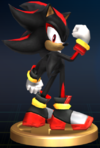
- Shadow
Shadow The Hedgehog is a black hedgehog who resembles Sonic. He was created by Dr. Eggman's grandfather, Gerald Robotnik, to be the ultimate life-form. Not only does he look like Sonic, but he has equal abilities. He has great skill with the space-time warping technique called Chaos Control. To reach his goals, he'll use any means necessary.
Shadow the Hedgehog is a black hedgehog who resembles Sonic. He was created by Dr. Eggman's grandfather, Gerald Robotnik, to be the ultimate life-form. Not only does he look like Sonic, but he has equal abilities. He has great skill with the space-time warping technique called Chaos Control. To reach his goals, he'll use any means necessary.
: SONIC HEROES
: SHADOW THE HEDGEHOG
Sticker[edit]
| Name | Game | Effect | Fighter(s) |
|---|---|---|---|
| Shadow The Hedgehog | Sonic Adventure 2: Battle |
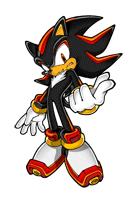 Shadow The Hedgehog (Sonic Adventure 2: Battle) |
In Super Smash Bros. 4[edit]
As an Assist Trophy[edit]
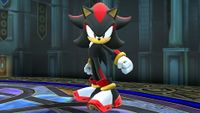
Shadow retains his role as an Assist Trophy that slows down time in SSB4. His distortions are more visually apparent in this game, appearing clearly in the foreground. His own visual aesthetics were also altered to be just as bright as in his home series, as well as his mouth's placement being more to the side of his muzzle instead of right below his nose, matching Sonic.
This time, Shadow has gained voice dubs in other languages like Sonic, with his portrayals in overseas versions being re-purposed from Sonic Generations; in English, he is voiced Kirk Thornton, who succeeded Jason Griffith since 2010 beginning with Sonic Free Riders. Kōji Yusa reprises his role in Japanese, with his portrayals re-purposed from Brawl.
Trophy[edit]
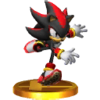
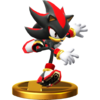
- Shadow
Engineered to be the ultimate life-form by the brilliant Professor Gerald Robotnik, this black hedgehog appears very much like Sonic. He has a dark side, however. In Smash Bros., he uses Chaos Control to warp space-time, slowing every fighter down except the player who summoned him.
: Sonic Adventure 2 Battle (02/2002)
: Shadow the Hedgehog (11/2005)
A black hedgehog created by Professor Gerald Robotnik to be the Ultimate Lifeform. Though he looks a lot like Sonic, he's ruthless and will do anything to achieve his goals. In this game, he uses Chaos Control to warp time and space, slowing down everything around whoever summoned him.
: Sonic Adventure 2 Battle (05/2002)
: Shadow the Hedgehog (11/2005)
In Super Smash Bros. Ultimate[edit]
As an Assist Trophy[edit]
Shadow returns as an Assist Trophy and now holds the green Chaos Emerald. As in Brawl and SSB4, Shadow performs Chaos Control to slow down the opponents of the fighter that summoned him. In addition to slowing down opponents, near the end of Chaos Control he will trigger a brief second phase that completely stops the opponents. His visual distortion is green and is much more apparent with lightning also striking around him. He cannot appear on 3D Land, Flat Zone X, Magicant, Midgar, Mute City SNES, Pac-Land, Spiral Mountain, Super Happy Tree, and WarioWare, Inc.
Spirits[edit]
Shadow appears as two different primary spirits. Super Shadow can be obtained by enhancing the Shadow the Hedgehog spirit at level 99.
Shadow's Spirit Battle uses a Sonic puppet fighter and is fought on the New Pork City stage's battlefield form. During the battle, Shadow appears as a hostile Assist Trophy while the Timer item appears, referencing Shadow's Chaos Control ability, which allows him to slow down and temporarily freeze time while holding a Chaos Emerald.
Gallery[edit]
Sonic and Shadow standing back to back on Final Destination.
Names in other languages[edit]
| Language | Name |
|---|---|
| シャドウ・ザ・ヘッジホッグ, Shadow the Hedgehog | |
| Shadow | |
| Shadow | |
| Shadow | |
| Shadow | |
| Shadow | |
| 夏特, Shadow | |
| 쉐도우, Shadow | |
| Shadow | |
| Шэдоу |
Trivia[edit]
- Much like Sonic, Shadow appears in the most Smash games out of all third-party Assist Trophies, having appeared in all games since its conception.
- Despite his trophy and official artwork sharing the same pose in Brawl, the mouths on the trophy and artwork are in different positions.
- In Brawl, the white of Shadow's shoes only covers the upper front similar to the red in Sonic's shoes, rather than going up to the soles like in the usual games. This was fixed in SSB4.
- Even on a fast moving stage such as Delfino Plaza or Rumble Falls when sped up, Shadow's effect will not stop even when he goes off the stage.
- Shadow's trophy pose in Brawl resembles his artwork for Sonic the Hedgehog (2006). Similarly, his trophy pose in SSB4 resembles his artwork for Sonic Rivals.
- Shadow is currently the only Assist Trophy to change voice actors between installments, switching his English voice actor from Jason Griffith to Kirk Thornton between Brawl and SSB4.
- Shadow is the only Assist Trophy to appear in an intro movie, with his cameo in the intro of Super Smash Bros. for Wii U. Though Riki also appears, he is only present as part of Shulk's Final Smash, Chain Attack.
- Shadow (in Smash 4 and Ultimate) and Knuckles are the only Assist Trophies to have voice actors in languages other than English and Japanese, being also voiced in French, Spanish, Italian, and German.
- In Ultimate, when Shadow poses after finishing his Chaos Control, the Chaos Emerald can still be seen in his hand. However, in his render on the official Ultimate website and in Training mode (which uses the same pose), the Chaos Emerald is not there.
- Shadow only disables normal hitboxes when affected characters are frozen in time. All other hitboxes that happen to be active when frozen remain active until the character is unfrozen. This creates several unintended side effects like counterattacks not functioning properly, attacks with reflective and absorption properties lasting much longer than normal, and characters remaining invincible and intangible for the entirety of their frozen state under specific conditions.[1]
- Shadow is the only Sega Assist Trophy to not share a move with a playable character. Knuckles shares the Homing Attack with Sonic, Rodin shares the Wicked Weaves and After Burner Kick, and Akira Yuki shares the Tetsuzanko with Bayonetta as well.
References[edit]
|
| |
|---|---|
| Fighter | Sonic (SSBB · SSB4 · SSBU) |
| Assist Trophies | Shadow · Knuckles |
| Stages | Green Hill Zone · Windy Hill Zone |
| Enemy | Eggrobo |
| Other Characters | Tails |
| Trophies, Stickers and Spirits | Trophies (SSBB · SSB4) · Stickers · Spirits |
| Music | Brawl · SSB4 · Ultimate |
